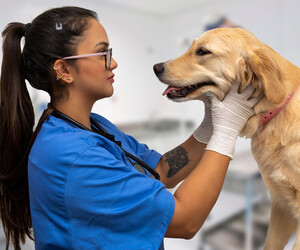Why Visiting a Veterinarian Enterprise Can Ensure the Long-Term Health of Your Pet
Why Visiting a Veterinarian Enterprise Can Ensure the Long-Term Health of Your Pet
Blog Article
Vaccination Guidelines From Your Trusted Veterinarian
Vaccination guidelines offered by your trusted veterinarian play an important role in guarding your animal's health and wellness and well-being. Core vaccines are basic for all pets, while non-core injections can be tailored to specific way of lives and environmental exposures. Comprehending the nuances of vaccination routines, which begin as very early as 6 to 8 weeks, is crucial for ideal protection. Furthermore, addressing typical false impressions surrounding injections can additionally boost animal owners' self-confidence in these preventative actions. As we check out these important aspects, it becomes significantly clear why normal appointments with your vet are vital for notified decision-making.

Importance of Vaccinations
Vaccinations play a critical duty in safeguarding pets against a range of preventable illness. By promoting the immune system to identify and deal with particular microorganisms, vaccinations significantly lower the occurrence of contagious diseases that can affect a pet dog's wellness and long life. Not only do vaccinations shield individual animals, but they also add to herd resistance, consequently reducing the general frequency of illness in the pet dog populace.
Prompt vaccinations help to reduce the spread of conditions such as rabies, parvovirus, and distemper, which can have serious consequences for both humans and animals. Additionally, vaccinations are commonly a requirement for boarding centers, grooming solutions, and dog parks, making them necessary for those that desire to mingle their family pets.

Core Vaccines for Pets
While the details inoculation requirements of pets can differ based upon private factors, core vaccinations are generally recommended to safeguard versus the most common and severe conditions (Pet Vaccinations). Core injections are those considered essential for all pet dogs, regardless of their lifestyle or geographic location, as they secure versus extremely contagious and potentially deadly health problems
For dogs, the core injections include those for canine distemper, parvovirus, adenovirus (liver disease), and rabies. Adenovirus can result in liver disease, while rabies is a zoonotic condition that poses a danger to both pet dogs and humans.
In pet cats, core vaccinations incorporate feline panleukopenia, feline calicivirus, feline herpesvirus (rhinotracheitis), and rabies. Feline panleukopenia is a very infectious viral condition that influences the immune system and intestines. Calicivirus and herpesvirus are significant contributors to upper breathing infections in felines, while rabies stays an essential concern for public health and wellness.
Talk to your vet to ensure your family pets get their core inoculations on time.
Non-Core Vaccines Explained
Non-core vaccinations are tailored to address details threats connected with an animal's environment, lifestyle, and exposure to specific diseases. Unlike core vaccinations, which are globally suggested for all family pets, non-core injections are thought about based upon individual situations. These vaccines are specifically important for pet dogs that might come across distinct pathogens due to their geographical area, travel habits, or activities.
Instances of non-core vaccines consist additional resources of those for Bordetella bronchiseptica, which is connected to kennel cough, and Lyme condition, caused by ticks. you can find out more Pet dogs that regularly communicate with other animals, such as those in boarding facilities, canine parks, or brushing environments, may gain from Bordetella inoculation. Likewise, if you live in an area where Lyme condition is prevalent, vaccinating against this condition can be a prudent option for outdoor-loving pet dogs.
Other non-core vaccines might consist of those for leptospirosis, canine influenza, and feline leukemia, depending upon the certain threat aspects existing. It is vital to have a complete discussion with your veterinarian regarding your pet dog's way of living and the prospective need for these injections, making certain a customized vaccination technique that ideal protects your hairy good friend.
Inoculation Set Up Summary

As animals grow, it is essential to comply with the advised booster vaccinations. Pet Vaccinations. For grown-up animals, core vaccines are commonly given every one to 3 years, relying on the details injection and regional guidelines. Non-core vaccinations may be advised based on way of life variables and local illness prevalence, requiring a tailored technique
Normal vet check-ups are critical for upgrading inoculation schedules. Your vet can offer assistance on one of the most proper booster shots for your family pet, considering age, wellness standing, and ecological threats. By staying aggressive and notified, family pet proprietors can guarantee their hairy friends obtain prompt and efficient vaccinations, thus protecting their health and wellness and well-being throughout their lives.
Common Myths Concerning Vaccinations
Mistaken beliefs regarding pet inoculations can result in complication and hesitation amongst family pet proprietors pertaining to the booster shot procedure. One common myth is that vaccinations are unnecessary for her response indoor pets. While it's real that interior animals encounter reduced dangers, they are not completely unsusceptible to conditions, as virus can be presented through various means, consisting of human garments and other pets.
An additional misunderstanding is that injections can trigger the diseases they intend to avoid. Actually, most vaccinations consist of inactivated or attenuated virus, which can not create illness in healthy pets. Some family pet owners also think that their animals should not be vaccinated if they are currently healthy and balanced; nevertheless, vaccinations are an aggressive action that assists avoid the start of health problem.
Additionally, lots of pet dog owners are afraid that injections will certainly bring about lasting health and wellness problems. While side results can happen, they are short-lived and usually light. The advantages of vaccination-- shielding pets from potentially deadly conditions-- far surpass the risks. Comprehending these usual myths is critical for responsible animal possession and ensuring the health and wellness of your fuzzy friends. Always consult your veterinarian for exact information customized to your pet dog's specific requirements.
Final Thought
In summary, adherence to vaccination guidelines is important for ensuring the health and longevity of animals. Core vaccines provide vital defense versus significant conditions, while non-core injections attend to particular risks based on private way of livings. Establishing a thorough inoculation timetable, combined with regular vet check-ups, assists in optimal wellness monitoring. Eliminating typical myths bordering inoculations even more reinforces the value of notified decision-making in pet treatment. Eventually, a proactive approach to inoculations is important for maintaining family pet well-being.
Not just do vaccinations safeguard specific animals, but they likewise contribute to herd immunity, thereby reducing the general prevalence of illness in the pet population.
Misconceptions concerning animal inoculations can lead to confusion and hesitation amongst animal proprietors concerning the booster shot process. While it's true that indoor pet dogs face lower threats, they are not entirely immune to diseases, as microorganisms can be presented via various methods, including human clothes and various other pet dogs.
Some pet owners additionally think that their animals ought to not be immunized if they are currently healthy; nevertheless, inoculations are an aggressive measure that aids protect against the onset of illness.
The advantages of inoculation-- shielding pet dogs from possibly deadly diseases-- far outweigh the dangers.
Report this page